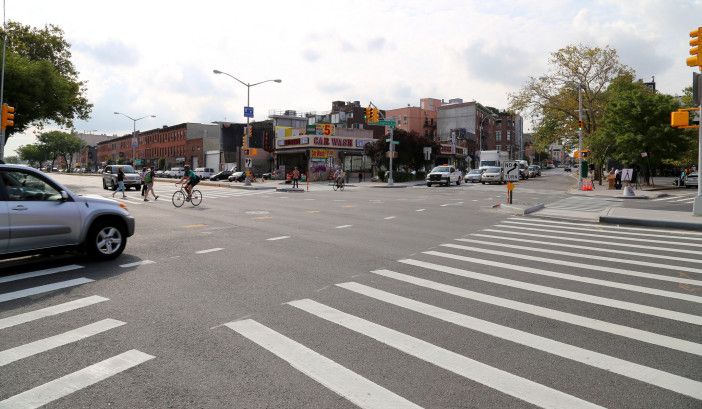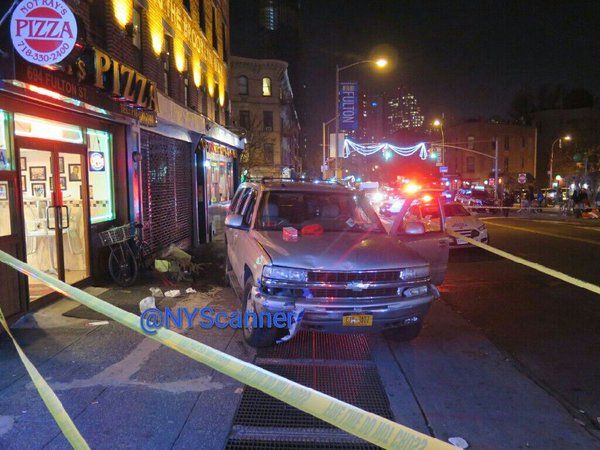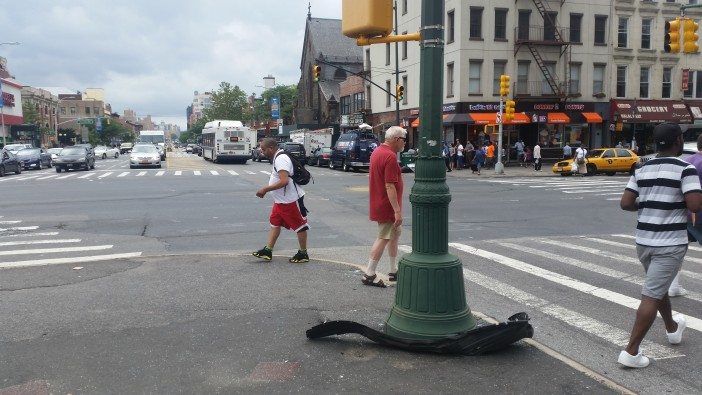2015 Year In Review: The Most Dangerous Intersections In Fort Greene-Clinton Hill


Street safety is a universal, timeless issue for residents of urban communities like Brooklyn, but this past year has repeatedly brought the issue to the forefront of our collective consciousness, with fatalities, injuries, close calls, and street design changes making the news on numerous occasions.
With that in mind, and with a new year less than three days away, we asked several of you what you consider to be the most dangerous intersections in Fort Greene and Clinton Hill — and which ones you hope to see some sort of improvement at in the year ahead. Let us know if you think we missed any and where you would add to the list.
The Washington-Atlantic-Underhill intersection saw several changes installed by the city Department of Transportation (DOT) this summer as part of a long-planned for effort at improved safety. Increased pedestrian crossing times, restricted left turns, left-turn signals, shortened crosswalks, added safety bollards, and more were among the safety measures added.
As local business owner and car crash victim John Longo, of Dean Street Restaurant, noted, “I got really lucky [in surviving being hit by a car at the intersection back in December, 2013]. . . And this intersection is a thousand times safer than it was.”

Fulton Street at Lafayette and Vanderbilt Avenues also make this list, with the most recent incident occurring nearby, with 30-year-old Victoria Nicodemus killed by a driver whose car jumped the curb at Fulton and South Portland.
Vanderbilt Avenue and DeKalb Avenue was also cited by residents, particular as it was just steps away from where nine-year-old Lucian Merryweather was killed in 2013 by another car that jumped the curb.
“It’s been two years and one month since we had a rally for Lucian and you’d think there would be repercussions by now,” said Hilda Cohen, neighbor and co-founder of Make Brooklyn Safer, a new group that focuses on traffic safety. “He was killed on the sidewalk and there is still no accountability against drivers.”
Flushing Avenue and Navy Street and Fulton and Nevins Streets are also cited, with one local teen noting that crossing the street is increasingly difficult to do.
“Crossing is really hard because cars go by way too fast,” said 13-year-old Esme, who has to cross streets in her home neighborhood of Fort Greene, as well as Boerum Hill and Downtown Brooklyn, which is closer to her school. “I stand still, hoping they stop. Even if there is a light, I find myself waiting for someone to cross before me.”

Of course, there is also the Flatbush-Atlantic-Fourth Avenue intersection, as well, where a cyclist was killed by a driver behind the wheel of an out-of-control SUV.
“These need to be shared streets,” said Councilmember Robert Cornegy. “My wife and I ride our bikes here every day, and I have a reasonable expectation that she will come home safe. . . Everyone drive safely, travel safely, so we can all get home safely.”
“There seems to be a randomness to people making turns with no blinkers. I didn’t realize how much safer I felt riding in Manhattan.For Fort Greene resident and dad Braden King, traveling safely has become more and more difficult over the years, especially in Brooklyn, where he said he “was surprised to feel less safe” riding a bicycle than when he is in Manhattan.
“I honestly think the way people drive in this city is borderline sociopathic in terms of ‘me first’ and ‘screw you’ attitudes,” King added. “New York’s come a long way, but it’s one of the uglier parts of this city. If it can be improved, it would improve life drastically.”
Where would you add to this list?




